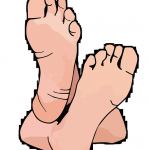Sweating is a natural bodily function that occurs when the body needs to regulate its temperature. It is the process of releasing fluid from the sweat glands located in the skin’s dermis layer. Sweat is mostly composed of water, but it also contains electrolytes, urea, and other substances.
Sweating is essential for maintaining a healthy body temperature, especially during physical activity or in hot weather.
Understanding the Science Behind Sweating
 Sweat glands are located all over the body, with the highest concentration on the palms of the hands, soles of the feet, and forehead. There are two types of sweat glands: eccrine and apocrine. Eccrine sweat glands are responsible for regulating body temperature and are activated by heat or physical activity. Apocrine sweat glands are located in areas with hair follicles and are activated by emotional stress.
Sweat glands are located all over the body, with the highest concentration on the palms of the hands, soles of the feet, and forehead. There are two types of sweat glands: eccrine and apocrine. Eccrine sweat glands are responsible for regulating body temperature and are activated by heat or physical activity. Apocrine sweat glands are located in areas with hair follicles and are activated by emotional stress.
The composition of sweat varies depending on the type of gland that produces it. Eccrine sweat is mostly composed of water and electrolytes, while apocrine sweat contains proteins and lipids that can cause body odor when broken down by bacteria on the skin’s surface.
The nervous system plays a crucial role in sweating. The hypothalamus in the brain regulates body temperature and activates sweat glands when necessary. The sympathetic nervous system also plays a role in sweating by activating eccrine sweat glands during times of stress or anxiety.
The Role of Genetics in Sweating
Genetics can influence how much a person sweats and where they sweat most. Some people have more active sweat glands than others, while others may have fewer active glands but produce more sweat per gland.
Eccrine sweat glands are present in all ethnicities, but apocrine sweat glands are more common in people of African or Asian descent. This can lead to differences in body odor between different ethnic groups.
Hyperhidrosis is a medical condition that causes excessive sweating beyond what is necessary for regulating body temperature. It can be caused by genetics or other underlying medical conditions.
The Benefits of Sweating
Sweating has several benefits beyond regulating body temperature. It can help detoxify the body by flushing out toxins through the skin. Sweating can also improve skin health by unclogging pores and reducing acne. Additionally, sweating can boost the immune system by increasing the production of antibodies and white blood cells. Finally, sweating can relieve stress by releasing endorphins, which are natural painkillers and mood boosters.
Common Causes of Excessive Sweating
Hyperhidrosis is a medical condition that causes excessive sweating beyond what is necessary for regulating body temperature. It can be caused by genetics or other underlying medical conditions such as thyroid problems, diabetes, or menopause.
Menopause is a common cause of excessive sweating in women due to hormonal changes that affect the body’s temperature regulation. Certain medications such as antidepressants and blood pressure medications can also cause excessive sweating as a side effect.
Tips for Reducing Sweating
There are several ways to reduce excessive sweating. Wearing breathable clothing made from natural fibers such as cotton or linen can help reduce sweat buildup. Using antiperspirant can also help reduce sweat production by blocking sweat ducts. Staying hydrated is important for regulating body temperature and reducing sweat production.
Avoiding spicy foods and caffeine can also help reduce excessive sweating as they can increase body temperature and stimulate sweat glands.
Sweating is a natural and important bodily function that helps regulate body temperature and has several health benefits beyond that. Understanding the causes and benefits of sweating can help manage excessive sweating and improve overall health and well-being.








